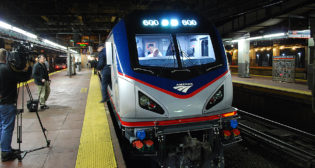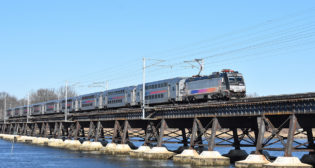
TWU’s “crappy boxed lunch,” a PTC paper tiger—and silence
Written by William C. Vantuono, Editor-in-Chief
Amtrak TWU food service workers protest cuts in dining car service. TWU photo.
I don’t need to write much about how the Transport Worker’s Union looks upon Amtrak President and CEO Richard Anderson’s purported quest to eliminate dining car service and dismantle the long-distance train national network. The poster below says it all. It’s funny, to be sure, but for thousands of Amtrak customers, the meaning behind it is sad and dehumanizing.
This is an ongoing battle. For the union’s perspective, read this story from its website.

Meanwhile, Anderson’s threat to stop running L-D trains on freight rail routes that won’t be equipped with PTC by the Federal Railroad Administration’s interim Dec. 31, 2018 deadline is beginning to look like a paper tiger, based on his August 2018 Quarterly Business Update, an employee communication. See the paragraph on PTC rollout, which refers to “filing for federal extensions”—by FRA definition, an Alternative Schedule. Meow!!

Anderson apparently doesn’t take well to constructive criticism, either. Former CEO Joe Boardman has been rather vocal about the various goings-on involving L-D trains and PTC, among other issues. Described to Railway Age by several sources as “volatile,” “bad-tempered,” and “unwilling to listen to anyone else’s opinion except his own,” including “people with practical railroad experience,” Anderson recently answered an employee question, posed in an internal forum, as follows:

From my perspective as a trade journalist, one of the worst things any company CEO can do is stonewall the media. Spin is one thing—I’ve seen plenty of it, and after more than 26 years am reasonably competent at recognizing it. But silence, refusing to have an honest, open discussion, a dialogue, whether in person, via phone or video chat or email, is undeniably disingenuous. Making an excuse that you’re “unavailable,” in this age of instant information and unlimited connectivity, doesn’t cut it, not by a long shot.
This is how Anderson has chosen to deal with the trade press (and as far as I know, the media in general). It’s a complete reversal from what I and many of my colleagues experienced with chief executives like Wick Moorman (whose tenure was way too short), Joe Boardman, Dave Gunn, etc.
The Amtrak press office, I’m told (for the record, not by anyone in that office), has been bound and gagged, forbidden to provide any information except sanitized corporate feel-good fluff.
As we all well know by now, Anderson has instituted a lot of changes, in particular, ones that impact service, the “customer experience,” in today’s corporate-speak language. His actions have generated mostly hostility, some of which has been repeatedly expressed in the Opinion section of this website, by folks with a lot of rail experience in their background. Case in point: This article.
The underlying question: What exactly are your intentions, Mr. Anderson?
Depending upon who’s expressing an opinion, Anderson is either (1) purposely and maliciously attempting to dismantle Amtrak’s national network and get rid of all long-distance services, (2) simply following the letter of the law (PRIIA 2014), or (3) genuinely trying to create a new, more-viable business model based on short- to medium-distance “corridor” and state-supported services.
There’s only one person who can speak to the broader rail industry and tell those with legitimate questions what’s going on: Richard Anderson—and he ain’t talkin’.
Railway Age gave him an opportunity to discuss things in a friendly format: Our June Rail Insights conference. Both Anderson and deputy Stephen Gardner refused, no explanation given except “they’re unavailable.”
Yeah, right. If you believe that, I’ve got a fleet of brand-new CAF Viewliner dining cars whose kitchens have been disabled and are now serving crappy boxed meals at $49 a pop to coach class customers on the Capitol Limited.
And it’s not just Railway Age that’s been stonewalled. Earlier this year, a producer at CBS’s vaunted 60 Minutes newsmagazine approached Anderson about participating in a report on passenger rail in the U.S. The producer was sent packing. 60 Minutes shelved the story. I’m not kidding.
Until Anderson decides to break his media silence, drop his guard, tell his side of the story and respond to his critics publicly, he will be the subject of speculation and hostility—“just another airline executive who has no business running a passenger railroad,” as one observer put it to me.
So, what’s it going to be, Mr. Anderson? You’ve got the ball. Will you run, pass or punt?



